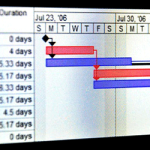
In my industry, timelines are rarely met. I would guess that 20% of all projects meet their original completion dates. And yet, it is one of the most, if not the most, important criteria specified by the various levels of government when measuring project performance. (If anyone in the highways industry reads this, please leave your comments below - I'd like to know … [Read more...]













